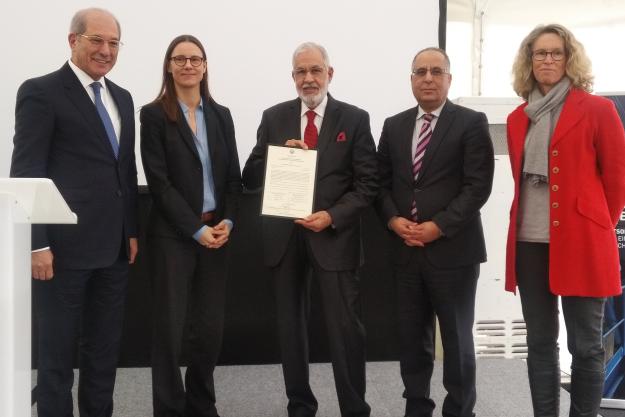
The Director-General of the Organisation for the Prohibition of Chemical Weapons (OPCW) and high-level Libyan and German officials mark the complete destruction of Libya’s chemical weapon stockpile
THE HAGUE, Netherlands — 11 January 2018 — The Director-General of the Organisation for the Prohibition of Chemical Weapons (OPCW), Ambassador Ahmet Üzümcü, applauded the complete elimination of the Category 2 chemical materials removed from Libya and transported to Germany for destruction at ceremony hosted by the Government of Germany and held on 11 January at the chemical weapons destruction facility operated by GEKA mbH in Munster, Germany.
In attendance were high-level Libyan and German officials, including: Minister of Foreign Affairs of Libya, H.E. Mr Mohamed Taha Siala; State Secretary, German Federal Ministry of Defense, Dr Katrin Suder; Deputy Federal Commissioner for Disarmament and Arms Control, German Federal Foreign Office, Ms Susanne Baumann; as well as the Permanent Representatives to the OPCW for Libya, Dr Ali Gebril Werfeli, and for Germany, Ambassador Christine Weil.
The Director General stated in his remarks: “Today’s event marks a historic occasion for disarmament and international security. It heralds the end of Libya’s chemical demilitarisation process and another step towards fulfilling the core goal of the Chemical Weapons Convention – the complete and permanent eradication of all chemical weapons.”

Director-General presents a certificate to the Libyan government in recognition of the complete destruction of all its declared chemical weapon stockpiles.
He further expressed that “the removal and destruction of approximately 500 metric tonnes of Libya’s Category 2 chemical agents was an extraordinary operation that necessitated agility, creativity, and above all close international cooperation”. The Libya operation represents “a prime example of the OPCW’s motto – working together for a world free of chemical weapons – in action”.
During the ceremony, the Director-General presented a certificate to the Libyan government in recognition of the complete destruction of all its declared chemical weapon stockpiles.
GEKA’s highly-capable specialised facility in Munster was designated to destroy the chemical weapons stockpile removed from Libyan territory in an international operation coordinated by the OPCW in 2016. The OPCW verified the completed destruction of these materials at GEKA on 23 November 2017.
Background
The Executive Council of the Organisation for the Prohibition of Chemical Weapons (OPCW) on 20 July 2016 adopted a decision calling for necessary international assistance in response to the Libyan Government of National Accord’s request for help destroying its remaining Category 2 chemical weapons on an expedited basis outside of Libya.
On 22 July 2016, the United Nations Security Council at UN headquarters in New York endorsed this decision and authorised urgent action.
Both UN Security Council resolution 2298 (2016) and the OPCW Executive Council decision recognised the extraordinary security and environmental challenges associated with these chemicals, which can be used by industry. As pre-cursors for chemical weapons, their removal and verified destruction guarantees they do not fall into the hands of non-State actors.
In August 2016, the OPCW facilitated and coordinated assistance among contributing countries to support the timely destruction of Libya’s remaining chemical weapons in the safest and most secure manner.
Canada, Cyprus, Denmark, Finland, France, Germany, Italy, Malta, New Zealand, Spain, the United Kingdom and the United States contributed personnel, technical expertise, equipment and financial resources. Notably, Denmark provided maritime assets to transport the chemicals to Germany. The chemicals reached the GEKA facility, which had extensive experience in disposing the effluent from Syria’s neutralised chemical agents, at the beginning of September 2016.
The destruction of Libya’s remaining Category 2 chemical weapons in the GEKA facility brought the total amount of the Libyan Category 2 chemical weapons destroyed to 100 per cent. Libya had previously destroyed all of its Category 1 and 3 chemical weapons.
As the implementing body for the Chemical Weapons Convention, the OPCW oversees the global endeavour to permanently and verifiably eliminate chemical weapons. Since the Convention’s entry into force in 1997 – and with its 192 States Parties – it is the most successful disarmament treaty eliminating an entire class of weapons of mass destruction.
Over ninety-six per cent of all chemical weapon stockpiles declared by possessor States have been destroyed under OPCW verification. For its extensive efforts in eliminating chemical weapons, the OPCW received the 2013 Nobel Prize for Peace.
More Information
- Ceremony Marking the Completion of the Destruction Process of Libya’s Remaining Category 2 Chemical Weapons Address by Ambassador Ahmet Üzümcü, OPCW Director-General Munster, Germany 11 January 2018
- Remove. Transport. Destroy: Achieving a Chemical Weapons-Free Libya [Video]
- Libya’s Remaining Chemical Weapon Precursors Arrive Safely and Securely at German Facility for Destruction
- Libya’s Remaining Chemical Weapon Precursors Successfully Removed
- OPCW Director-General Welcomes UN Security Council Resolution and OPCW Executive Council Decision; Pledges to Facilitate Verifiable Destruction of Libya’s Remaining Chemical Weapons
- Report by the Director-General: Status of the Implementation of the Plan for the Destruction of Libya’s Remaining Category 2 Chemical Weapons Outside the Territory of Libya
- OPCW Executive Council Decision (EC-M-52/DEC.1): Destruction of Libya’s Remaining Chemical Weapons
- UN Security Council Resolution S/RES/2298 (2016)
- OPCW Fact Sheets
